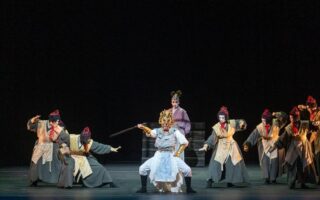Iphigenia in the war zone at Ancient Epidaurus
Actor Anthi Efstratiadou speaks to Kathimerini about her leading role in Timofey Kulyabin’s much-anticipated adaptation of Euripides’ tragedy

Her life until the final year of high school was solely dedicated to track and field. An athlete specializing in middle-distance running events, she was ready for the Gymnastics Academy. However, a career guidance test changed everything, revealing a talent for theater and dance, despite her limited exposure to performing on stage. “The need to escape from Athens was very strong within me, so I applied to the Faculty of Fine Arts at the Aristotle University of Thessaloniki,” Anthi Efstratiadou, one of the finest actors of her generation today, tells Kathimerini.
Seventeen years in the theater industry, honored with the Melina Mercouri Theater Award and the Karolos Koun prize, she has tackled significant roles. Her new challenge is “Iphigenia in Aulis” by Euripides, directed by Timofey Kulyabin, which opens this year’s Epidaurus Festival on July 5 and 6. This international production is a world premiere designed for the Argolic theater, and it might also travel outside Greece.
Efstratiadou has played Iphigenia before, in 2019 with the National Theater of Northern Greece (NTNG). “And indeed in the same translation by Pantelis Boukalas, but with a completely different approach to the staging. This time it’s an adaptation. Kulyabin’s goal was to speak primarily about the present. He didn’t focus on the mythological aspect, the foundation of every tragedy, as much as on the conditions of war and the relationships between the characters,” says the actor.
Was it challenging or easier for her to interpret the same role within five years? “Knowing the text helps; you’re not following an unknown path, but the second time creates anxiety about what paths you’ll take.” That’s where the director comes in. She emphasizes that Kulyabin is one of the rare directors who create a pleasant atmosphere themselves. “He approaches the performance very personally and enjoys the process. This brings the team closer together.”
The performance of Anton Chekhov’s “The Three Sisters,” which we saw in sign language in 2018 when the Athens Epidaurus Festival introduced the Russian director to the Greek audience, was considered a “masterpiece” by critics and the public. The second collaboration in Greece was with the Onassis Stegi, Bernard-Marie Koltes’ “In the Solitude of Cotton Fields,” with John Malkovich. Kulyabin, a director with a radical, daring perspective and modern interpretation of classic texts since 2006 at the age of 22, is now, at 39, staging plays across the continent. In “Iphigenia in Aulis,” which we will see in Epidaurus, featuring Efstratiadou, as well as Maria Nafpliotou, Nikolas Papagiannis, Dimitris Papanikolaou, Thanos Tokakis and Nikos Psarras, he focuses on a contemporary political reading of the classic work. “The play doesn’t question whether the war will happen, but when. For me, everything is about the technologies of war, politics and the media,” he said at a recent press conference.
‘Massive operation’
The war is closer to us than we think. According to the director, “it is a massive operation.” A critic of Vladimir Putin, he lives and works in self-exile in Berlin due to the political situation and his views on the invasion of Ukraine. “He is a pioneering director who provides very specific conditions and guides you through the performance. To draw on some material, he might share a story, not necessarily personal, but something that has happened in his country,” says Efstratiadou.
What did Kulyabin change or cut in Euripides’ work? “He cut the female chorus and all the mythological parts. Throughout the performance, there is a male chorus of five to six people, a symbolic presence. They resemble the threads that drive the process of war.
However, instead of a chorus, the director has made them a higher state authority, like a secret service. He wants to show that war is the result of underground situations driven by military authority and political leadership, creating excuses and pretenses that influence public sentiment to start [the war].”
‘Instead of a chorus, the director has made them a higher state authority, like a secret service’
In their first meeting, they had a long discussion, and then he asked her to read. “He has a completely different culture from ours, which is Mediterranean, and at the same time, he has something touching, almost childlike that I can’t explain. I left feeling agitated and full. Like when you meet someone and something happens that unsettles you but you don’t know exactly what. Maybe it was the discussion about the text, which lasted a long time. A text with many difficulties and many unanswered questions, like Iphigenia’s transformation. During rehearsals, time was limited, and we knew from the start that the performance would be completed in a month and a half.”
In the previous staging of “Iphigenia,” the actress went through a period of personal research. “Now I tried to connect more with the director and his story. He directs, but there is also room for improvisation within the framework he sets.”
Regarding her character, she notes that Iphigenia is essentially a child who has to confront death, see her parents – especially her father – differently, leave home, and enter the military environment of a war zone. “We have in mind Iphigenia as a heroic, selfless girl. She reaches absolute despair; it is inevitable that she will die. Today, it would be a premeditated murder for the common good. A killing to become a pretext for a war.”
‘Sacrifice’
The heroines that Efstratiadou likes change from period to period. “I am currently interested in the connection between the light and the very tragic. I want to be led to deeper areas in a lighter way. Potentially, all heroines could be like this,” she says, and while she talks, she fidgets with her short hair, as if looking for the rich, glossy mane we all envied. I ask if she sacrificed it for the role of Iphigenia. “It was my idea, and they accepted it. In recent years, I’ve been experimenting with clothes, makeup, and now hair. It helps me; It’s something I didn’t do in the past. I also felt a need to do collages or draw next to the text, as if my imagination opened up in a different way.”
Shy from a young age, she hasn’t shed her reticence. “When I started getting more actively involved in acting, I wasn’t comfortable with the terrifying exposure of the profession. For some reason, though, I continued, with difficulty. I wasn’t one of those kids who went easily to a drama school and came out boldly seeking roles. The opposite happened to me: I was reserved, and the things I liked were team-based. Then, my professor, Yannis Leontaris, took me into the Kunigunda group, where I stayed until it dissolved. I wanted a framework, a form of security that happened to be given to me. I learned a lot there and started to mature.”
Athlete’s discipline
Today, she realizes how much the discipline of athletics helps in theater. “I could easily focus on something and be patient, but in middle-distance running, when your body says it’s tired, you keep going. It doesn’t easily perceive the limits, and that’s why I often exceeded them physically and got injured in the theater. Because of athletics, I thought that by being patient, things would happen. But that’s not always the case.”
In her work, she wants directors, and everyone involved, to be open. “Not to be complex, not to carry psychological personal burdens that might complicate the process.”
As an athlete, she felt pressure. As a student in Thessaloniki, she felt confused without a conscious goal. But now she’s sure she found the profession she loves. “It has difficulties but also many emotions. You come into contact with texts you never imagined, embody them, breathe them. You play characters outside your psyche, but you also delve into difficult psychological areas of your own, which means you bring your dark parts to light. Theater helped me.”
Anthi has a two-and-a-half-year-old daughter. How does she manage to balance with real life? “It’s hard to combine survival with the artistic choice and to be a present mom. In recent years, I focused on being a mom.”
Timofey Kulyabin’s “Iphigenia in Aulis” by Euripides. Duration 1 hour 40 minutes. Tickets from 16 euros. At the Ancient Theater of Epidaurus on July 5-6, starting at 9 p.m. With Greek and English surtitles.






